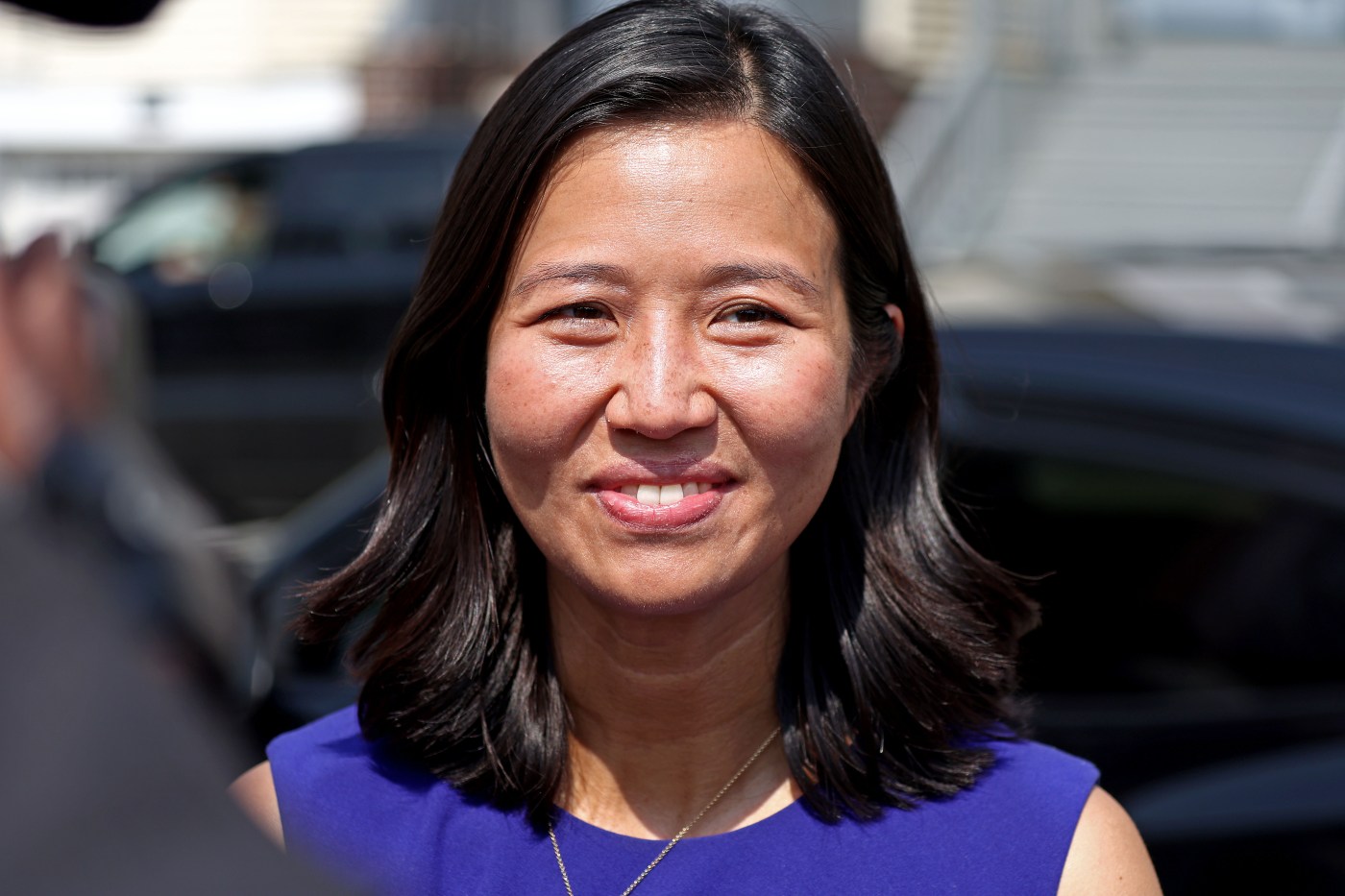
Boston Mayor Wu says remaining COVID relief funds to be spent on affordable housing, small business initiatives
Boston Mayor Michelle Wu said the remaining $7 million of the city’s $558 million in federal pandemic relief funds will go toward initiatives aimed at helping residents afford housing and supporting small businesses most affected by COVID.
The mayor made the announcement Monday, noting that the city is legislatively required to allocate the remainder of its American Rescue Plan Act funds, awarded by the Biden-Harris administration, by the end of the calendar year, and then spend the entirety of its ARPA funds by the end of 2025.
“Even with that two-year runway, many projects take multiple years to do, so we need to put them to places where we have things up and running, know they’re going to get out the door and be used, and have maximum impact,” Wu said at a press conference in Mattapan, where she was joined a majority of the City Council.
“That’s why these particular programs are the ones that the Council and our administration have filed for now,” the mayor added.
The remaining funds will be split between three initiatives centered around affordable housing and local business investments, Wu said.
The mayor said $3 million will go toward the Boston Housing Authority’s First Home Program, which provides BHA residents seeking to become first-time homebuyers with up to $75,000 in down-payment assistance.
The funds will allow the program, which has helped 50 people since its launch in November 2022, to continue through the end of 2026, her office said.
Keanna Rice, a program recipient, said she was considered to be low income when she first secured public, income-restricted housing through the BHA, but through the years was able to secure higher pay through her career, and decided to apply for down payment assistance for a new home, rather than continue to pay market rent.
Now, she said she lives in her own home with her son in Boston, adding that by securing housing, she is set up for the future, and plans work toward building “generational wealth.”
“This is a dream,” Rice said. “Not everyone can afford a house, especially not in this market.”
Another $3 million will go toward the Mayor’s Office of Housing Acquisition Opportunity Program, which helps to create more affordable rental opportunities for residents.
It works by supporting the “acquisition of market-rate buildings by responsible, mission-oriented developers to stabilize tenancies and create long-term income restricted housing for low- and moderate-income renters,” the mayor’s office said.
The new funding allocation will leverage roughly $9 million in private financing to support the acquisition of additional apartment buildings with the aim of stabilizing the tenancies of residents and families at risk of displacement, Wu’s office said.
Sheila Dillon, the city’s housing chief, said the program has stabilized about 1,000 families, 400 units of which received ARPA funding. More than 350 additional units are “in the pipeline,” she said, where “good organizations” and “good developers want to do the same thing.”
The last $1 million will go toward the city’s SPACE grants program, which is administered by the Office of Economic Opportunity and Inclusion and aimed at supporting small businesses in industries hit the hardest by the pandemic, such as restaurants, retail stores, and fitness and wellness centers, Wu’s office said.
Related Articles
Boston City Council ‘chaos’, lack of support from Mayor Wu prompted Suffolk SJC clerk bid, Erin Murphy says
Boston Mayor Wu rescinds Summer Street bus lane that wasn’t working ‘as intended’ in bustling Seaport
Former Massachusetts state worker, Boston city employee whose salary spiked wins pension court case
Coalition forms to ’embolden and inspire’ Boston city councilor considering mayoral bid
Boston School Committee signs off on White Stadium redevelopment negotiations over community protest
Segun Odowu, the city’s chief of economic and opportunity, said the grant program has helped roughly 60 entrepreneurs, businesses that have hired or created close to 600 new jobs in Boston.
While the city has dedicated roughly $240 million of its ARPA allocation to housing initiatives, the mayor acknowledged, when asked by a reporter, that several other priorities of hers aimed at increasing housing affordability have stalled in the state legislature after receiving local approval from the Council.
Those city-sponsored proposals are for rent control, a transfer fee on high-ticket real estate transactions, and a bill that would allow Boston to temporarily increase commercial property taxes beyond the state limit to offset what the mayor says would otherwise be a significant increase in residential taxes next year.
“We’re still in conversations,” Wu said, “and are going to keep pushing for what matters for Boston and for our community members.”
Boston Housing Chief Sheila Dillon (Angela Rowlings/Boston Herald, File)
Mayor Michelle Wu, Lt. Gov. Kim Driscoll join others for a ribbon cutting at an affordable housing complex in Mattapan, last year. Mayor W announced Monday the city would use $7 million in ARPA funds to boost affordable housing efforts. (Nancy Lane/Boston Herald, File)

